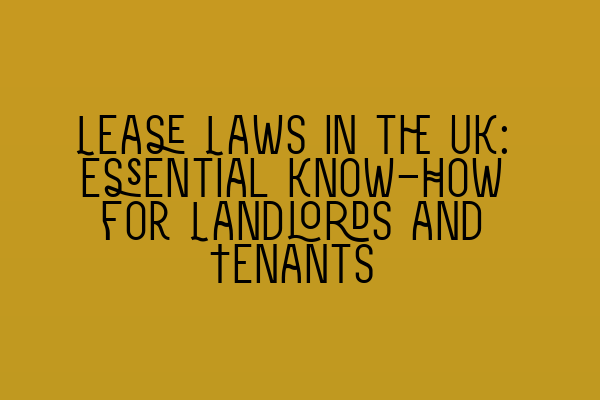Lease Laws in the UK: Essential Know-How for Landlords and Tenants
Leasing property is a significant aspect of the real estate market in the United Kingdom. It involves a contractual agreement between a landlord and a tenant, setting out the terms and conditions under which the property will be occupied. Understanding lease laws is crucial for both landlords and tenants to ensure a smooth and legally sound renting experience.
In this blog post, we will explore the essential know-how of lease laws in the UK, covering important topics such as types of leases, lease agreements, rights and obligations of landlords and tenants, termination of leases, and dispute resolution. So, let’s dive in!
Types of Leases:
In the UK, there are two main types of leases: fixed-term leases and periodic leases. A fixed-term lease has a specific start and end date, typically lasting for a certain number of years. On the other hand, a periodic lease continues on a rolling basis, usually month-to-month or week-to-week, until terminated by either party.
Lease Agreements:
A lease agreement is a legally binding contract that outlines the rights, responsibilities, and obligations of both landlords and tenants. It covers important details such as rent, security deposit, maintenance responsibilities, and any additional terms and conditions agreed upon by both parties.
It’s important for landlords and tenants to carefully review and understand the lease agreement before signing it. This step can help avoid future disputes and ensure both parties are on the same page.
Rights and Obligations of Landlords:
Landlords have certain rights and obligations under lease laws in the UK. Some key rights of landlords include the right to receive rent on time, the right to enter the property for inspections or repairs (with prior notice), and the right to evict tenants in certain circumstances.
However, landlords also have obligations towards their tenants. These obligations include providing a safe and habitable property, carrying out necessary repairs and maintenance, giving reasonable notice before entering the property, and protecting the tenant’s deposit in a government-approved tenancy deposit scheme.
Rights and Obligations of Tenants:
Just like landlords, tenants also have rights and obligations. Tenants have the right to live in a safe and well-maintained property, the right to privacy, and the right to “quiet enjoyment” of the property without unnecessary interference from the landlord.
Tenants are also obligated to pay rent on time, keep the property clean and in good condition, report any damages or repairs needed, and adhere to the agreed-upon terms and conditions of the lease agreement.
Termination of Leases:
Lease termination can occur in various ways. For fixed-term leases, the lease agreement will outline the procedure for termination at the end of the agreed-upon period. If either party wishes to terminate a periodic lease, they must provide proper notice in accordance with the agreed-upon terms.
In cases of lease breaches or violations, landlords can initiate eviction proceedings through the courts. It is essential to follow the correct legal process to avoid any potential liabilities.
Dispute Resolution:
Disagreements and disputes can arise between landlords and tenants, and it’s important to know how to resolve these issues amicably. In some cases, mediation or negotiation can help both parties reach a mutually satisfactory resolution. However, in more complex disputes, seeking legal advice or taking the matter to court may be necessary.
Conclusion:
Lease laws in the UK provide a framework for landlords and tenants to establish and maintain a beneficial renting relationship. Understanding the types of leases, lease agreements, rights and obligations of both parties, termination procedures, and dispute resolution mechanisms is vital for a smooth and hassle-free renting experience.
If you want to dive deeper into contract law or other related topics, don’t forget to check out our articles on Ethics in Contract Law, Misrepresentation in Contracts, A Closer Look at SQE Contract Law Syllabus, SQE Contract Law Landmark Cases and Judicial Decisions, and Contract Law for Services Key Considerations and Best Practices.
At SQE Property Law & Land Law, we are here to provide expert legal guidance and support for all your property law needs. Whether you are a landlord or a tenant, understanding lease laws will help you navigate the complexities of renting in the UK and ensure a fair and mutually beneficial arrangement for all parties involved.
